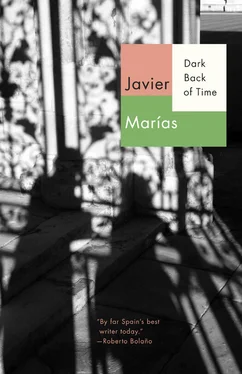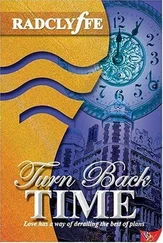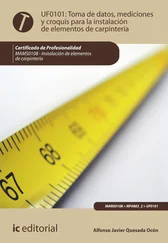Javier Marias - Dark Back of Time
Здесь есть возможность читать онлайн «Javier Marias - Dark Back of Time» весь текст электронной книги совершенно бесплатно (целиком полную версию без сокращений). В некоторых случаях можно слушать аудио, скачать через торрент в формате fb2 и присутствует краткое содержание. Год выпуска: 2012, Издательство: Vintage Espanol, Жанр: Современная проза, на английском языке. Описание произведения, (предисловие) а так же отзывы посетителей доступны на портале библиотеки ЛибКат.
- Название:Dark Back of Time
- Автор:
- Издательство:Vintage Espanol
- Жанр:
- Год:2012
- ISBN:нет данных
- Рейтинг книги:3 / 5. Голосов: 1
-
Избранное:Добавить в избранное
- Отзывы:
-
Ваша оценка:
- 60
- 1
- 2
- 3
- 4
- 5
Dark Back of Time: краткое содержание, описание и аннотация
Предлагаем к чтению аннотацию, описание, краткое содержание или предисловие (зависит от того, что написал сам автор книги «Dark Back of Time»). Если вы не нашли необходимую информацию о книге — напишите в комментариях, мы постараемся отыскать её.
Dark Back of Time — читать онлайн бесплатно полную книгу (весь текст) целиком
Ниже представлен текст книги, разбитый по страницам. Система сохранения места последней прочитанной страницы, позволяет с удобством читать онлайн бесплатно книгу «Dark Back of Time», без необходимости каждый раз заново искать на чём Вы остановились. Поставьте закладку, и сможете в любой момент перейти на страницу, на которой закончили чтение.
Интервал:
Закладка:
As he tells it in his In Quest of El Dorado , Graham went back with him to the Hotel Isabel, at the corner of República del Salvador and Isabel la Católica, where Ewart was lodging on the recommendation of “a Spaniard” who had given him the address on the train. It was kept by an English-speaking German who, still according to Graham, tried to be ingratiating. He visited his friend’s fifth-floor room and admired its view of the mountains. Still, it didn’t strike him as a good place to write and “I meditated getting him to change over to the Iturbide.” In The Life and Last Words of Wilfrid Ewart , however, Graham says the hotel had been suggested by “a Mexican lady” whose card he found with its name written in pencil on the back. He also says that they first went to the Iturbide so Ewart could see the fountain and the “banana palms” that the conjugal couple could contemplate from their suite, and that Ewart, charmed, “had half a mind” to move there that very afternoon, at which point they made for the Isabel to ask for and immediately settle the bill. But the owner took so long drawing it up and made so many mistakes that Wilfrid left it for the next morning. I imagine that these small or not so small contradictions don’t mean much and may have arisen from the sheer boredom of having to recount the same thing twice in the same way. We all try to avoid that (to the annoyance of children), if only so that the same thing will never be quite the same. Nevertheless, the contradictions certainly fertilized the ingenious and entirely baseless speculations as to a possible crime made in the aforementioned 1989 article by Sergio González Rodríguez, who fantasized about the possibility that Graham had murdered Ewart out of jealousy related to his wife, literary jealousy, envy of his overnight success, or some brooding military rancor. In any case, Graham’s two books both date from 1924, so the hypothesis of lapses or treacheries of memory can be discarded, particularly for a man who turned forty that year, and would go on to live fifty years more.
Ewart’s sudden fascination with Mexico City — a surly, quarrelsome place of no culture and no comfort, without one tolerable theatre — was odd. But he was much taken with the climate and the parks, especially Chapultepec, or so he said. He also liked the numerous booths or sidewalk stands run by young female manicurists who were sometimes curtained off and sometimes visible. During that lunch on the 30th he exhibited his gleaming nails to the Grahams with great satisfaction.
13
Graham’s detailed account of the 31st day of December, 1922, in Mexico City, offers excellent proof that, however hard one tries, the events immediately prior to the final event, the catastrophe, have no reason to be perforce significant or even of any interest whatsoever. When someone dies unexpectedly, we try to reconstruct what they said the last time we saw them, as if this could somehow save them; we try to remember the final day, once we know it was final, with an effort we would never make had it been only the penultimate, or just any ordinary day of the many forgotten days of lost time, and so we deceive ourselves, shining on the occasion a light that did not belong to it, not its own light but that of the ending; death, with its suspended brilliance, illuminates whatever came before it (“Put out the light, and then put out the light”), even what was shadowy or grey, in and of itself, and unimportant, never intended or hoped or planned to leave a trace of any kind and was already fading away. Unforeseen or premature death contaminates what preceded it, shooting out its retrospective flames which change everything; what was no more than the day before yesterday is suddenly transformed into “the final years,” in the standard phrase of articles and biographies, which often speak of the deceased “during his final years,” as if anyone could have anticipated that; and some anodyne yesterday is stylized by the blade of repetition that chisels and idealizes and fixes it forever in our minds, because all at once it has acquired the ominous status of the day before the end, which in its own moment it did not have. We try to confer solemnity on what turned out to be the last thing, in most cases a charlatan, fictitious, inculcated, borrowed solemnity, as if it tormented us to think that we might, in our ignorance, lose some word or gaze or gesture of farewell, or to accept that the other person’s death caught us off guard, preventing us from seizing the final stretch of his life and being its attentive witnesses, before the metamorphosis. Our awareness of not having intuited this farewell — of not knowing that it was one — weighs on us, if we were convinced we’d see the other person at least once more, though he was already ill and we were afraid he wouldn’t last much longer. And we struggle to remember signals, signs, cruel ironies, unnoticed omens of what happened next, and that calms us, like seeing a film a second time or rereading a book and then taking note of the premonitions or forewarnings of its denouement, now that we know what it is and there is no one who can change it.
Speaking for myself, it’s difficult to evoke the last time I saw Aliocha Coll or even to know with any certainty when it was; he was a friend who committed suicide quite a while after that last time and not long before our next meeting, which did not take place, and how could I know of his approaching end when perhaps even he didn’t know — but of course he did, he knew, he decided on the date — and so I let a couple of days go by in his city (Paris) without calling him, in the optimistic plan of doing it a little later, when I would have wrapped up my stupid activities (but those two adjectives, optimistic and stupid, belong above all to his death, the cessation of his light, which made my perfectly natural thought seem ridiculous and belittled my activities, which were probably only superfluous, and has now entirely erased them: I have no knowledge at all of what I did during those days; my date book says I travelled to Poitiers and returned to Paris, but my memory contains no trace of Poitiers). And given my difficulties with reconstructing that time, I attempted it in a semi-fiction or story entitled “Todo mal vuelve” or “Everything Bad Comes Back,” after one of the last phrases he wrote to me, in a telegram. But that story isn’t enough, because I believe I have still never confused fiction with reality — yes, I do believe that — and I know that my memory of his final words and gestures and his final state of mind and his final countenance is only amorphous, I think it was over lunch in the Brasserie Balzar on rue des Ecoles, but I’m not sure and don’t want to go paging through my date books right now — from which he will have disappeared after that final day, whenever it was — and in any case that lunch which may have been our last meeting is mingled with others that took place in the anodyne indifference of the time that went before and was lost. He was forty-two when he killed himself in 1990 with his unerring doctor’s hand, after rereading a last story — Nerval’s “Sylvie”—listening to a last piece of music — I don’t know what it was — and finishing his last glass of wine. In fact I wouldn’t have seen him again even if I had called him as soon as I arrived in Paris on November 20, because although I learned of his death on the 23rd, he had committed suicide on the 15th. He left two letters, neither was for me, he had already written me many.
And sometimes it’s very hard for me to bear the fact that I was unaware of my mother’s serious illness, Lolita was her name. It was kept from me and I wasn’t living in Madrid and didn’t see her often and was too immersed in the passing problems — or perhaps misfortunes, or only chagrins — of my twenty-sixth year to perceive the concealment and try to find out a thing you believe cannot happen and which is therefore the explanation you first rule out. A still juvenile, or superstitious, or complacent belief. And when I came to my belated realization of what was coming to her, I quickly returned from the pointless travels of those months of turmoil and she lasted only a few hours longer after my arrival; sometimes I’ve thought that she lived those hours and then no more because with me there we were all at her side, at home, the four sons — and the fifth or first still closer, soon to be in her care, the child — and at last she could let herself go, knowing that all four of us were, for the moment, safe and with her and at home. Yes, it’s possible. A little more than a year ago I found what must have been her penultimate letter to me, the fourth son she gave birth to, third among those still living, dated November 3, 1977, less than two months before her death; in it she discreetly offered to help me, because during a recent brief visit of mine at home she had seen me looking sad, without knowing why (“The capacity for respect that leads me to forget the secrets people tell me, for I never reveal them, and I try to make peace, has been useful to other people more than once … and to you boys? Can’t I help you?”), and went on to say, “I slept better while you were here, as I alway do when I know you’re here, sleeping; but now I can’t sleep and I turn it over and over in my head, I know that there is something I don’t know, and that always makes me give free rein to my imagination when it has to do with you boys … There are so many problems around all of you!” And perhaps, once she knew that the only one who was missing was now nearby, at home, and that he had said goodbye to her, she could sleep once and for all. I sometimes wonder whether she didn’t hold out against that sleep until my arrival, more than she should have and beyond exhaustion, it would have been unlike her not to wait for me before saying goodbye. Not long before she had said to my father, “I’m a doctor’s daughter and I know what I have,” because they had hidden the seriousness of her condition from her, as well, and she went on to describe precisely the nature of her illness and what it was going to do to her. In the final hours during which we coincided something ordinary happened that ceased to be ordinary because it was among the last things, and so it is what I remember most. I had recently been in Paris and seen a very large Rubens exhibit there and bought a number of postcards. She was in bed and I sat down on the edge, she had stopped dying her hair — but for me it is always black — and it was a very clean grey, surrounding her face that was so much like mine and that never became wrinkled, or hardly, her skin full and smooth. She looked drowsy and dazed, and I showed her postcards of Rubens paintings to distract her, she enjoyed museums very much. She looked at each one in turn, having to force herself a little to focus her attention and her gaze, I made a comment here or there. She stopped at the portrait of a woman, Helen Fourment, less brightly colored and more sharply etched than the large compositions. “Look at that hand,” she said, pointing to the young woman’s right hand, then smiling at the extravagant hat. “If I’d worn that I would have looked taller,” she said playfully. Every time I see a Rubens now I remember that moment, Helen Fourment’s hand, and the hat, and her. It goes without saying that I hadn’t allowed her to help me, almost two months earlier; I rarely told my parents about my personal affairs, which generally upset them; like most children, or those of my generation at least, I said nothing. Well, I must have told her something, just enough to keep her imagination from mistakenly wandering toward worse things than those actually happening to me and to calm her apprehensions a little, because in her last letter, which I lost in one of my moves, I remember that she responded tactfully, saying, “No, I don’t understand, but I also understand that I don’t understand.” In the car that took me to her burial the next day I saw my face in the rear view mirror, and I rode along, drowsy and dazed, thinking: “I’m what’s left that’s most like her. I’m what’s left that’s most like her.” It was December 24; I don’t have many other memories of her final hour, I arrived on the 23rd, a little late.
Читать дальшеИнтервал:
Закладка:
Похожие книги на «Dark Back of Time»
Представляем Вашему вниманию похожие книги на «Dark Back of Time» списком для выбора. Мы отобрали схожую по названию и смыслу литературу в надежде предоставить читателям больше вариантов отыскать новые, интересные, ещё непрочитанные произведения.
Обсуждение, отзывы о книге «Dark Back of Time» и просто собственные мнения читателей. Оставьте ваши комментарии, напишите, что Вы думаете о произведении, его смысле или главных героях. Укажите что конкретно понравилось, а что нет, и почему Вы так считаете.












